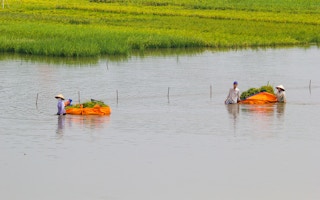A regional coalition of non-government organisations has called on government leaders of the Association of Southeast Asian Nations (Asean) to speak as ‘one voice’ and prioritise financing as a response to the increasing impact of climate change in the region, including on food security.
To continue reading, subscribe to Eco‑Business.
There's something for everyone. We offer a range of subscription plans.
- Access our stories and receive our Insights Weekly newsletter with the free EB Member plan.
- Unlock unlimited access to our content and archive with EB Circle.
- Publish your content with EB Premium.
Asean For a Fair, Ambitious and Binding Global Climate Deal (A-FAB) released a policy brief titled Weathering Extremes: The need for a stronger ASEAN response on Monday, which detailed the effects of the worst weather calamities in Southeast Asia in the last decade, and which cost tens of thousands of lives and more than US$4 billion annually.
“The expected worsening of such trends due to climate change demands an Asean response that is much stronger than what the regional bloc is currently offering,” said the NGO group, which comprises Oxfam, Greenpeace Southeast Asia and Eastern Regional Organisation for Public Administration (Eropa).
“
Extreme weather events are increasing in the region, and we all suffer from its impacts. I think this should be a call for us to work together, especially in terms of adaptation and mitigation.
Dr. Tun Lwin, CEO of Myanmar Climate Change Watch
On the back of the UN Climate Summit, which was held in New York on Tuesday, A-FAB pressed Asean leaders to be more active and transparent in their participation at the United Nations Framework Convention on Climate Change (UNFCCC) and to demand a fair, ambitious and binding global climate deal, including financing for adaptation as well as loss and damage.
Climate change is no longer an issue of individual countries, but an issue of the entire region, noted Dr. Tun Lwin, chief executive officer of Myanmar Climate Change Watch and author of the paper.
“Extreme weather events are increasing in the region, and we all suffer from its impacts. I think this should be a call for us to work together, especially in terms of adaptation and mitigation,” he added.
The paper also highlighted the impacts of extreme weather on agriculture, the region’s main source of livelihood.
Riza Bernabe, Policy and Research Coordinator of Oxfam’s East Asia GROW campaign, commented: “With agriculture threatened by climate change, livelihoods of millions of poor families are at risk. There will be significant effects on food security. We should not wait until it is too late to act.”
Meanwhile, Greenpeace Southeast Asia Political Advisor Zelda Soriano suggested that Asean should consider policy support for renewable energy to mitigate the region’s contribution to global warming by phasing out subsidies on fossil fuels, and instead work towards transitioning to low-carbon renewable energy.
Other recommendations stated in the paper include:
- Help member countries become more climate resilient by encouraging them to allocate sufficient budgetary resources for adaptation and mitigation programmes
- Take a more unified approach at the national, regional and international level when dealing with the impacts of climate change. This can be done by harmonising climate policies between government agencies.
- As a regional bloc, develop a framework and plan of action on adaptation in agriculture, focused on sustainability, food security and climate resilience. One of the outcomes of this initiative, the paper said, should include the development of regional alternatives in financing mechanism.
“We cannot continue with a business-as-usual scenario if we want to ensure our safety and that of future generations,” Soriano said.










